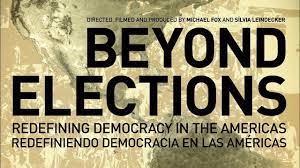Democracy as we understand it has proved to be resilient in various forms. However, the definition itself presents dubious ambiguities that change how democracy is understood. Scholars even argue that the meaning of democracy has been altered such that it has been hijacked and appropriated in areas that do not reap the benefits of relentless capitalism. In the documentary, Beyond Elections, directors Sílvia Leindecker and Michael Fox revisit the contemporary understanding of democracy and challenge the complexity of political systems across the America’s. Specifically in Southern America, regions that have confronted the shortcomings of neoliberal democracy have found different ways to leverage the deficiencies. Some communities have found it useful to undertake participatory budgeting, cooperatives, and other forms of horizontally structured political systems. I believe that these systems are breaking our contemporary understanding of democracy, and it is shedding light on the deficiencies that exist in the current political models we routinely advocate. To illustrate this, I will demonstrate the effectiveness of horizontal political systems, compare them to current neoliberal democratic structures, and suggest why reformation of the current democratic political system should be considered.
To begin, it is important to visit the value of democracy and ask why it has gained prevalence amongst the modern human lifestyle. As stated by Olin Wright, “the value underlying democracy is the value of self-determination, of people being in control of their lives rather than having their lives controlled by others” (Wright, 2013, p.5). The fundamental notion of individualism that gained popularity in America around the 19th century has since become embedded within the political underworking’s of democracy (Lukes, 2022). Whereby, freedom of choice has the capacity to simultaneously exhibit individualistic yet cohesive qualities. Though, neoliberal democracy has inserted different issues within this discussion; placing focus on the market relations and policies that surround free choice. Moreover, understanding that democracy is an open concept whereby people have the ability to participate in the decision-making process is imperative to criticize its faults and bring forth change.
The documentary previously mentioned provides an insightful take on how democracy is interpreted by various Latin American groups in South America. Where in countries such as Venezuela and Brazil, systems of communal councils and participatory democracy yield high adherence amongst poor communities (Leindecker & Fox, 2008). These systems show how horizontally structured politics can bring forth meaningful change through means of participation and accountability. Heller concludes “procedural democracy becomes substantive democracy, only to the extent that lower class demands are organized and find effective representation in the state” (Heller, 2001, p. 131). Substantive democracy amongst poorer groups is thus advantageous when we abandon typical vertical structures of politics that require less participation and accountability. The effectiveness lies within the representation process of disadvantaged communities being able to directly affect their respective needs.
Similarly, the political structure that holds its prevalence in the richest of countries is the neoliberal democracy. The underpinnings of this system foster principles that are different than those inherently embedded in democracy itself. What I mean by this is that democracy paves way for the distribution of equal rights and opportunities by allowing people to be a part of the decision-making process. However, neoliberal democracy expands these rights and opportunities at the expense of collective interests and social welfare. Take, for example, the current election process that prevails across the globe with an emphasis on North America. The documentary noted that there are typically two main political parties that run against each other, both of which have similar yet different agendas for which the citizens of a nation vote. As scholars deduce the idea that this entire system is “inherently divisive”, it highlights the efficacy of participatory democracy and how this political process reconciles the deficiency that was presented by neoliberal ideologies. They also stated that “voting only legitimizes a system based on exclusion” whereby in places such as Canada, less than half of the people who are able to vote actually go out and participate (Leindecker & Fox, 2008). Also, political campaigns and promises are not guaranteed nor sought out to the extent of holding politicians accountable for false hope. Rather than evidently dividing a community’s decision-making outcomes into strongly segregated portions of society, participatory democracy allows those charged with governance of a nation to be held accountable for the decisions that are made since they directly connect with the communities seeking change.
Furthermore, I believe participatory governance should be heavily incorporated into the political systems we use across the globe since the current neo-liberal structure is not designed to effectively advance social welfare. Reducing the gap between the rich and the poor is the only genuine way to maintain democracy’s true definition. Such that, we should be voting for policies and not people. By doing this, we create a less divisive democratic system that encourages co-production which can be defined as “the application (or organization or production) of public policy. It occurs when the state is not alone in being involved in the implementation of a public policy, but shares responsibility with non-state organizations, from the private sector, the third sector, or both sectors at once” (Vaillancourt, 2009, p. 285). This is very important for the reformation of the current political regime as it fosters real democratic principles of freedom of choice and the right to contribute to the decision-making process.
Overall, like any social construct, democracy will continue to adapt with the communities governing its practice and execution. While developing nations have found participatory budgeting, communal councils, and cooperatives to be effective, these systems still need to grow popularity amongst a privileged subset of Americans whose focus is on the individual rather than the collective growth and prosperity of a nation. So, it is not to disregard that democracy is effective in many forms and has led the wealthiest of nations to such positions of power, however, I urge that true democracies should increasingly advocate for social welfare to uphold its values.
